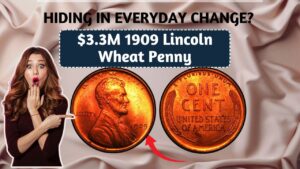Imagine peeling back the flap of your worn leather wallet and spotting what seems like a simple copper coin—only to discover it’s worth more than a Manhattan penthouse suite. Sounds surreal? Perhaps. But that illusion could be your lived reality. The legendary Lincoln Wheat Penny, specifically the elusive 1943 copper variant, has recently been appraised at a staggering $1,111,111. And here’s the wild twist: this minuscule fortune might still be masquerading as pocket change.
Cent Beyond Sense
The Lincoln Wheat Penny Allegedly Worth $88 Million

Crafted to honor the steely resolve of Abraham Lincoln, the Lincoln Wheat Penny made its grand debut in 1909. Its visage? Honest Abe etched into the obverse; two bowed wheat stalks embracing the reverse. The design graced American currency until 1958, when it quietly bowed out, replaced by the austere Lincoln Memorial.
Though billions of these cents flooded into existence, anomalies—those minted on the wrong metal, or bearing slight imperfections—now carry value far exceeding their humble denomination.
1943 Anomaly Worth Seven Figures
1964 Kennedy Half Dollar Is Worth $200,000 Do You Have One?

The coin that’s stirring collectors into a fevered frenzy? The rare 1943 Lincoln Wheat Penny minted on copper, not steel. That year, America, waist-deep in World War II, redirected copper supplies for munitions and switched pennies to zinc-coated steel. Yet, a scant few copper blanks, likely leftovers from 1942, slipped through the mint’s meticulous processes.
These errant copper coins? Today, they’re mythical relics. Most 1943 pennies glimmer silver—a cold, industrial steel hue. But if yours gleams a warm, ruddy copper? You might be clutching an unintentional masterpiece—one so rare, one fetched $1.1 million on the collector’s block.
10 Ultra-Rare Coins Secretly Be Worth $250 Million Check Your Change Now

It’s not mere fantasy. Experts—coin dealers, numismatists, and sharp-eyed appraisers—whisper that several of these copper oddities might still be circulating, unnoticed and uncelebrated. Many were likely spent decades ago by unaware hands, vanishing into jars, drawers, or dusty cash registers.
Now, treasure-hunters of all ages are scrutinizing every penny they handle. One casual glance could re-route your financial destiny.
Clues Hidden in Plain Sight
- Inspect the Year: The digits must read 1943.
- Check the Tint: If it flashes copper-brown instead of silver-steel, proceed with care.
- Magnet Trickery: A steel penny clings to magnets like iron to lodestone. A copper one floats away, aloof and unaffected.
- Handle With Reverence: Never scrub it clean. Leave the patina untouched. Instead, present it to a reputable coin specialist or grading firm.
What Makes It So Coveted
The $9.99M Lincoln Wheat Penny Hiding in Plain Sight, Check Your Coins

Scarcity breeds desire. And when a piece of currency is birthed from bureaucratic error, it becomes lore. This wasn’t supposed to happen—a few copper blanks slipped through the cracks during a time of wartime austerity. Now, collectors revere them not merely as currency, but as historical happenstance: a metallic footnote to a global war.
The recent million-dollar headline reignited a mania—coin dealers are being flooded by curious seekers armed with magnifying glasses and hopeful hearts.
Life-Changing Coin in Your Palm
Rare 1958 Lincoln Wheat Penny Still Circulating Worth $5,555,555!

It’s not hyperbole. That mundane penny in your change cup might just be the golden ticket—camouflaged in plain view, waiting for discovery. A single, sleepy coin that could tilt your life on its axis.
So next time a cashier drops a few coins into your palm, pause. Look closely. Feel the metal. That faintly glinting penny might carry more than 100 years of history—and a million-dollar secret.
FAQs
What exactly is a Lincoln Wheat Penny?
Rare 1916-D Mercury Dime in Jewelry Box, Now Worth $127,000

A U.S. one-cent coin minted from 1909 to 1958, featuring Lincoln’s profile and twin wheat stalks.
Why is the 1943 version worth a fortune?
Because it shouldn’t exist. Most 1943 pennies were forged from steel. A rare batch, due to a minting oversight, used leftover copper blanks.
How can I identify the rare 1943 copper version?
Rare 1943 Penny Worth $4.4M Still in Circulation Check Your Coins ASAP!

Look for the 1943 stamp. If it’s copper-hued and not magnetic, take it to an expert. Fast.
Could one still be circulating?
Absolutely. Some may still be unknowingly tucked inside piggy banks, antique boxes, or retail drawers.
Where can I authenticate my coin?
The Lincoln Wheat Cent Worth $305,000

Seek out respected numismatists or coin grading services—preferably those with years of credibility and experience.





Leave a Comment